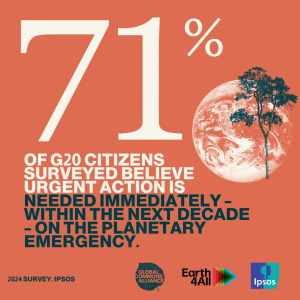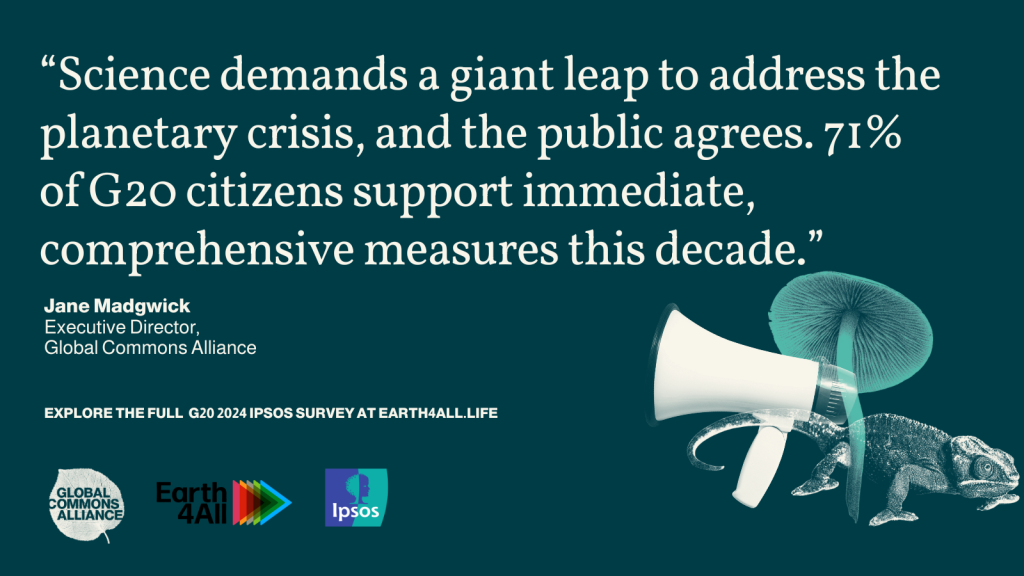June 24, 2024
- Across 17* G20 countries surveyed, a majority of adults (68%**) support the policy proposal where wealthy people pay a higher tax on their wealth, as a means of funding major changes to our economy and lifestyles.
- When thinking about climate change and protecting nature, 71% of people across 18 G20 countries surveyed believe major action is needed immediately – within the next decade – to reduce carbon emissions.
- Higher carbon taxes, higher progressive taxation on income and higher tax rates for large businesses also receive support from a majority across the 17 G20 countries surveyed, to fund major changes to our economy and lifestyles.
- People want political and economic reform. Two in three people across 17 G20 countries surveyed (68%) agree that the way the economy works should prioritize the health and wellbeing of people and nature rather than focusing solely on profit and increasing wealth.
A new survey of adult citizens in 18 of the world’s largest economies has revealed majority support for tax reforms and broader political and economic reform. (Not all questions were asked in China, as indicated when findings reference 17 G20 countries.)
Around two-thirds (68%) of citizens across 17 G20 countries surveyed back a wealth tax on wealthy people as a means of funding major changes to our economy and lifestyle, with only 11% opposed, while 70% support higher rates of income tax on wealthy people, and 69% favor higher tax rates on large businesses, according to the survey conducted by Ipsos.
Support for a wealth tax on wealthy people is highest in Indonesia (86%), Turkey (78%), the UK (77%) and India (74%). Support is lowest in Saudi Arabia (54%), and Argentina (54%), but still over half the respondents surveyed. In the United States, France and Germany around two in three of those surveyed support a wealth tax on wealthy people (67%, 67% and 68% respectively).
Results also show that when thinking about climate change and protecting nature, 71% of citizens in 18 G20 countries surveyed believe the world needs to act immediately, within a decade to reduce carbon emissions from electricity, transport, food, industry and buildings. This rises to 91% of Mexicans, 83% of South Africans and 81% of Brazilians surveyed. This belief is lowest – but still over half of respondents – in Saudi Arabia (52%), Japan (53%), the United States (62%) and Italy (62%).

The findings come as finance ministers from G20 countries, including the United States, China, and India, prepare to meet in Brazil this July. For the first time, a wealth tax is on the agenda as these nations deliberate on strategies to address economic and environmental challenges.
The survey, commissioned by Earth4All and the Global Commons Alliance, explored support for economic and political transformation in 18 of the G20 nations.
The survey highlighted broad support for using additional tax revenues to fund policy proposals to changes to our economy and lifestyles. Key areas with strong support include green energy initiatives, universal healthcare and strengthening workers’ rights. Even less popular proposals, such as universal basic income and investment in citizens’ assemblies to strengthen democracy, attract support from about half of respondents.
Owen Gaffney, co-lead of the Earth4All initiative, stated, “The message to politicians could not be clearer. The vast majority of people we surveyed in the world’s largest economies believe major immediate action is needed this decade to tackle climate change and protect nature. At the same time many feel the economy is not working for them and want political and economic reform. It’s possible this may well help explain the rise in populist leaders.”
“Our survey results provide a clear mandate from those across the G20 countries surveyed: redistribute wealth. Greater equality will build stronger democracies to drive a fair transformation for a more stable planet.”
Jane Madgwick, Executive Director at the Global Commons Alliance, echoed this urgency, saying, “Science demands a giant leap to address the planetary crisis, climate change and to protect nature. And 71% of citizens in 18 G20 countries surveyed support immediate action within the next decade to reduce carbon emissions.”

In 17 G20 countries surveyed, a majority of people believe economies should move beyond a singular focus on economic growth.
68% of those across 17 G20 countries surveyed agree that the way their country’s economy works should prioritize the health and wellbeing of people and nature rather than focusing solely on profit and increasing wealth. Furthermore, 62% agree that a country’s economic success should be measured by the health and wellbeing of its citizens, not how fast the economy is growing.
Trust in government is low, with only 39% of people in 17 G20 countries surveyed believing their government can be trusted to make decisions for the benefit of the majority of people, and just 37% trusting their government to make long-term decisions that will benefit the majority of people 20 or 30 years from now.
 There is a notable demand for reform of national and global political and economic systems. In the 17 G20 countries surveyed, 65% of respondents believe their national political system needs major changes (36%) or to be completely reformed (29%). A similar proportion (67%) feel the same about their country’s economic system (41% that it needs major changes and 27% that it needs to be completely reformed).
There is a notable demand for reform of national and global political and economic systems. In the 17 G20 countries surveyed, 65% of respondents believe their national political system needs major changes (36%) or to be completely reformed (29%). A similar proportion (67%) feel the same about their country’s economic system (41% that it needs major changes and 27% that it needs to be completely reformed).
Sandrine Dixson-Declève, executive chair of Earth4All and co-president of the Club of Rome said, “This survey proves once again that the majority of citizens across G20 countries believe it is time for an economy that delivers greater wellbeing, more climate solutions and less inequality. But the results also show a lack of trust in government especially in Europe. With the recent European elections moving towards the radical right, we need to hold governments accountable to introduce an economy that services people and planet at the same time.”
The survey also asked whether people are optimistic or pessimistic about their future. On average, 62% of people in 18 G20 countries surveyed are optimistic about their own future. However, only 44% feel positive about their country’s future, while 38% are optimistic about the future of the world. Participants in emerging economies like Indonesia, Mexico, Brazil, and India, along with those in China and Saudi Arabia are the most optimistic while participants in Europe and those in Japan and South Korea tend to be less optimistic.
*Unless stated “18 countries”, these questions were not asked in China.
**Percentage results are an arithmetic average of national results across the G20 countries surveyed.
- Access the full Ipsos research
- View our social media toolkit (coming soon)
NOTES TO EDITORS
For more information and to arrange interviews please contact: Florence Howarth | 07585504293
In addition to a global report, regional reports for all surveyed countries are available.
Ipsos surveyed 22,000 participants aged 18 to 55-75 in total across 22 countries. This included 18 G20 countries (Argentina (1,000), Australia (1,000), Brazil (1,000), Canada (1,000), China (1,000), France (1,000), Germany (1,000), India (1,000), Indonesia (1,000), Italy (1,000), Japan (1,000), Mexico (1,000), Saudi Arabia (1,000), South Africa (1,000), South Korea (1,000), Turkey (1,000), United Kingdom (1,000), United States (1,000)), plus four counties outside the G20: Austria (1,000), Denmark (1,000), Kenya (1,000) and Sweden (1,000). All interviews were conducted online and took place between 5th March and 8th April 2024.
Overall percentage results are an arithmetic average of national results across the 18 G20 countries surveyed (or 17 G20 countries in the case of questions that were not asked in China).
Quota sampling was used, and in each country data are weighted to be representative of the national population on age, gender, region and working status. Where results do not sum to 100, this may be due to rounding, multiple responses, or the exclusion of ‘don’t know’ categories.
The research was commissioned by Earth4All and the Global Commons Alliance. Supporting partners include the Policy Institute Kings College, ISWE and the Wellbeing Economy Alliance.
About Earth4All
Earth4All is a vibrant collective of leading economic thinkers, scientists and advocates, convened by The Club of Rome, the BI Norwegian Business School, the Potsdam Institute for Climate Impact Research and the Stockholm Resilience Centre Earth4All builds on the legacies of The Limits to Growth and the Planetary Boundaries frameworks. Earth for All: A Survival Guide for Humanity, was published in September 2022 and presents the results of a major two-year research collaboration.
Earth4All advocates for five key turnarounds to achieve wellbeing for all within planetary boundaries:
1. Eliminate poverty by growing the economies of the poorest countries through green investment and cancelling their debts to high-income countries.
2. Reduce inequality by increasing taxes on the top 10%, strengthening workers’ rights and introducing citizens’ funds to give everyone access to a nation’s wealth.
3. Empower women by increasing access to education, putting them in leadership positions and equalising pensions.
4. Transform food systems by cutting waste and stopping the conversion of wild landscapes to farmland.
5. Transform energy use by immediately phasing out fossil fuels, electrifying everything and seriously investing in renewables and energy efficiency.
About The Global Commons Alliance
The Global Commons Alliance is a growing coalition of scientists, philanthropists, civil society groups, businesses and innovators, enabling collective action to safeguard the global commons.
The Global Commons Alliance’s mission is to mobilize citizens, companies, cities and countries to accelerate systems change, and become better guardians of the global commons.
